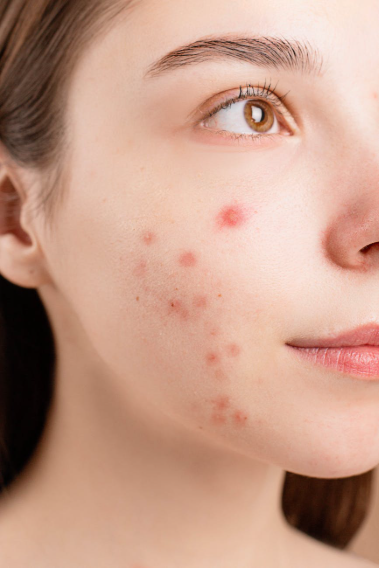If you’ve ever popped a pimple, you know the aftermath—a scab that just won’t go away. While you might try to cover it up with makeup, that unsightly scab can be stubborn, and no amount of concealer seems to help. If you’re dealing with overzealous scabbing, it’s essential to know how to speed up the healing process and take proper care of your skin.
Let’s dive into how to heal acne scabs effectively, along with some useful tips to prevent them from lingering longer than necessary.
Do Acne Scabs Heal on Their Own?
Yes, acne scabs typically heal on their own. When you damage your skin, such as by popping a pimple, your body forms a scab to protect the wound from bacteria and prevent infection. It’s your skin’s natural healing process, so it’s important to resist picking at the scab to allow it to do its job. Over time, with the right care, your scabs will heal, and new skin will emerge underneath.
However, a few factors can slow down healing:
- Trauma to the follicle: Constant plucking or improper removal can damage the hair follicle, which may prevent hair from growing back.
- Vitamin deficiencies: Lack of essential vitamins like B, C, D, and iron can impair your skin’s healing.
- Stress and poor diet: A balanced diet and stress management are key to supporting skin recovery.
- Age: As we age, some follicles stop producing new hair, slowing the healing process.
If your acne scabs are a one-time issue, they will most likely heal within a few weeks without major complications.
How Long Does It Take for Acne Scabs to Heal?
Typically, it takes about 3 to 7 days for a scab to heal. The exact time can vary based on your skin’s overall health and how deep the scab is. For the scab to completely fall off and reveal healthy skin beneath, the process may take up to four months, depending on your age and skin condition. You’ll likely see some regrowth and healing within 4 to 8 weeks.
Tips to Speed Up the Healing of Acne Scabs
While your skin is doing its thing, there are a few steps you can take to help accelerate the healing process:
- Keep Your Skin Moisturized
Moisture is key for healing. Applying petroleum jelly or Vaseline to the scab helps keep it hydrated and speeds up the healing process. Moist skin heals faster and more efficiently. - Cleanse Your Skin Gently
Avoid further irritation by cleaning your face gently with warm (not hot) water. Pat your face dry instead of rubbing to prevent dislodging your scab prematurely. - Skip Makeup
Applying makeup to broken skin is tempting, but it can slow down healing and irritate the scab. If you must cover it up, try using breathable makeup that doesn’t clog pores. However, leaving your skin bare and allowing it to heal is the best option. - Try Hydrocolloid Bandages
These small, sticky patches are excellent for keeping scabs moist and promoting faster healing. They absorb excess fluid and create a favorable environment for scabs to heal. Simply apply one before bed and let it work overnight. - Use a Warm Compress
Applying a warm compress to the area can help improve blood circulation and speed up cell regeneration. It can also help reduce itching, which is a common problem when healing scabs. - Avoid Touching the Scab
As tempting as it might be, resist the urge to pick or scratch at the scab. Doing so will only delay the healing process and may cause scarring. If the temptation is overwhelming, cover the scab with a bandage to keep your hands away.
What to Do If You Picked Your Scab
If you’ve already picked at your scab, don’t panic. A new scab will form, but you may have to start the healing process again. Picking the scab increases the risk of scarring, so it’s essential to be patient and give your skin time to recover.
Once the scab has healed, you can treat any potential scars with natural oils or scar treatments to lighten them and make them less noticeable.
Preventing Acne Scabs in the Future
While you can’t prevent pimples from occurring, there are steps you can take to reduce the chances of developing scabs:
- Always Cleanse Your Skin at Night
Whether you wear makeup or not, always cleanse your face before bed to remove dirt, oil, and bacteria that can clog pores and lead to pimples. - Avoid Touching Your Face
Constantly touching your face transfers bacteria from your hands to your skin, leading to breakouts. Break this habit to keep your skin clean and clear. - Check Your Hair Products
Some hair products, especially those with oils or fragrances, can transfer to your skin and clog pores, leading to breakouts. If you often experience pimples on your forehead, your hair products could be to blame.
Conclusion
Dealing with acne scabs can be frustrating, but with proper care, they’ll heal in no time. Avoid picking at them, keep your skin moisturized, and follow these simple tips to speed up the healing process. With a little patience, your skin will be back to normal and scab-free.

发表回复